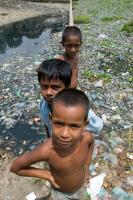About 125 million people could be made homeless by rising sea levels due to a projected four-to-five degrees Celsius increase in global temperature this century.
Research released by Greenpeace said Bangladesh, Pakistan and India have almost 130 million people living in the coastal zone most vulnerable to sea-level rise, erosion and drought.
The study comes at a time of rapid growth throughout South Asia, not only in energy consumption but also population. Not surprisingly, nobody is suggesting cutbacks on either front.
The report paints a grim picture of Bangladesh’s 75 million people seeking refuge en masse, with a further 50 million migrants scrambling to higher ground in India from densely populated coastal regions.
And what did the report suggest as a way to minimize impact? “India should seek policy options that are proactive in terms of developing international strategies to reduce the risk of destructive climate change.” Not too clear, but certainly inoffensive.
And Greenpeace isn’t alone in not wanting to tread on certain toes. The Paris-based International Energy Agency was equally cautious a few months ago, when it refused to urge either India or China to curb energy consumption, although runaway demand in those countries will make it impossible to achieve meaningful emissions reductions.
China and India are the world’s most populous nations and their energy use is projected to double from 2005 to 2030. By 2030, they will account for nearly half the 55 per cent increase in global demand. Both have resisted calls to limit emissions, saying energy use per person is still much lower than in industrial nations.
The IEA, in essence, agreed: “China’s and India’s energy challenges are the world’s energy challenges, which call for collective responses.”
And that leaves us, where?
Subscribe to our newsletter
Stay up to date with DeSmog news and alerts







